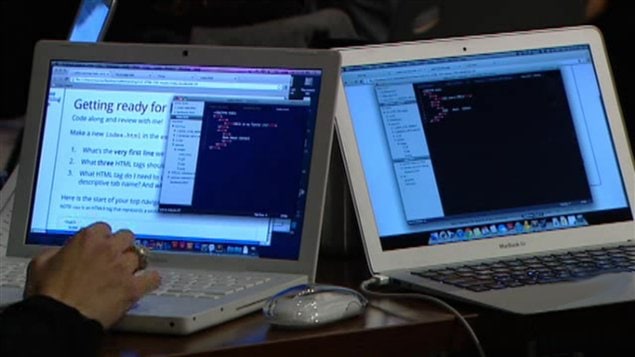In the international survey of adult skills, Canada scored above average, but not by much..
The Organisation for Economic Co-operatino and Development (OECD) released its international study on adult skills this month.
The survey of adults aged 16-65 was conducted in 24 developed countries including Canada and graded their ability in literacy, numeracy, and problem-solving all in connection with information technology..
Andrew Parkin, is the Director General of the Council of Ministers of Education Canada. The council helped manage the Canadian portion of the survey conjunction with the federal government.
Listen

This first survey targetting adult skills involved some 166,000 people in the 24 countries, including 27,000 people in Canada, which was the largest sampled group.
The survey included people from all walks of life who agreed to sit down for tests that could last up to 90 minutes
The purpose is to enable countries to gauge the ability of their population to function in the new and changing technological world and to see where their population stands in its skills abilities in relation to other countries and so create policies in relation to the findings.
While in general terms Canada placed slightly above the OECD average, the survey also showed a large gulf within the population. While a large percentage were easily able to master complex problem solving skills, this survey showed that a substantial number of Canadians had marked difficulties.
Problem solving in technology-rich environments is defined as the ability to use digital technology, communications tools and networks to acquire and evaluate information, communicate with others and perform practical tasks.
Among Canadians surveyed, 37 per cent scored at the top two levels of computer competency, which was more than the OECD average of 34 per cent. But 15 percent were at the lowest end, with basic information and communication technology skills to take the test but with difficulty in solving problems. This was 3 percent more than the average,
However when it came to numeracy, scores were below average with 23 percent performing at the lowest level of ability to read and work with numbers at a level necessary for modern life. The OECD said this put Canada far down the list.
There were also some surprising findings in literacy with 17 percent scoring low on the scale with 4 percent having only a basic vocabulary and the ability to locate a single piece of information in a brief written text.
The results show that while generally Canada is on par with OECD countries, with a slightly lower average in literacy and numercy, the population is polarized, with a large group unable to cope with an information-age society.
One of the reasons for this gulf says Mr Parkin is the high percentage of immigrants, many of whom did not have English or French as a first language and who come here from extremely diverse backgrounds and situations.
The implications are of concern. Of high school graduates in Canada (roughly age 17-18) less than 50% took senior courses in math, science, technology or engineering. This comes at a time when 70% of Canada’s top jobs require and education in those fields.
In addition, as information technology advances ever more rapidly, there is a strong likelihood that the polarization that currently exists between those who cope easily and those left behind, will only grow.
As education in Canada is primarily a provincial responsibility, Mr Parkin says that the various education ministers across the country do examine the results carefully. He notes that although it’s difficult to make immediate changes, the results are considered in future policy decisions which are critical if we are to keep from falling behind. He adds that even if we are improving year over year over our own previous performance, if other countries are improving at a fast pace, we will still be falling behind.
OECD ADULT SKILLS REPORT
http://skills.oecd.org/OECD_Skills_Outlook_2013.pdf







For reasons beyond our control, and for an undetermined period of time, our comment section is now closed. However, our social networks remain open to your contributions.